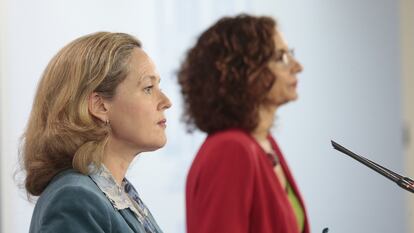Spain raises spending ceiling by over 50% to deal with coronavirus fallout
The central executive makes allowances for greater expenditure, but warns that the economy will contract by around 11.2% this year due to the crisis

The Spanish government has approved an unprecedented increase of over 50% in the spending ceiling, which will be set at €196 billion. The decision made on Tuesday by the Cabinet paves the way for drafting a new national budget, which Spain has not had since 2018.
The limitation on non-financial expenditure is a barrier setting the maximum amount that ministries may spend. In February, before the coronavirus crisis hit, the ceiling had been set at €127.6 billion for 2020, a 3.8% rise from the previous years.
But the upper limit has just been raised more than ever before, thanks to financial assistance from the European Union. The Spanish government is expecting to receive €140 billion in the coming years from an EU recovery fund, of which more than €20 billion will be available in 2021.
Impact on GDP
Also on Tuesday, the government offered a revised estimate of the effects of the coronavirus crisis on the economy. The new forecast is for an 11.2% fall in gross domestic product (GDP) in 2020, down from the government’s previous estimate of 9.2%. Madrid also expects to see growth of 7.2% in 2021, compared with its previous prediction of 6.8%.
The revised numbers are more in line with those published by major national and international institutions. The Bank of Spain last month announced that it expects the economy to shrink between 10.5% and 12.6% this year, while the International Monetary Fund (IMF) is expecting it to contract by 12,8%, and to rebound by as much as 7.2% next year.
Fresh coronavirus outbreaks and new restrictions on mobility are the main reasons behind these revised figures, caused by a slowdown in economic activity despite a partial rebound in the summer, when a three-month lockdown was lifted.
Spain’s economy minister, Nadia Calviño, said on Tuesday that the current scenario is still marked by significant uncertainty, but that high-frequency indicators, which provide a recent, short-term picture of the economy, suggest that GDP bounced back vigorously in the third quarter of the year, “around 13%.” “We are still seeing a recovery scenario shaped like an asymmetrical V,” she said at a news conference following the Tuesday Cabinet meeting.
Deficit goals
Another anomaly is the fact that the EU’s fiscal policy rules have been placed on hold this year and the next due to the exceptional situation caused by the coronavirus pandemic. Under the EU’s Growth and Stability Pact, government deficit should not be more than 3% of GDP, and total government debt should not exceed 60% of GDP.
This means that the Spanish government no longer needs to get its debt and deficit goals approved by Congress this year, in what would have been a difficult vote sure to further delay the drafting of the new budget. Spain is currently under a minority center-left administration made up of the Socialist Party (PSOE) and junior partner Unidas Podemos that lacks the power to get legislation passed without support from other parties.
The suspension of the fiscal rules affects not just central but also regional and local authorities. On Monday, the Finance Ministry gave regional governments a new reference rate for 2021: where the agreed deficit before the pandemic had been 0.1% of GDP, now the limit has been raised to 2.2%. Half of this amount, said Finance Minister María Jesús Montero, could be funded by the central government with a transfer of over €13.4 billion.
Montero also said that the bulk of this year’s national deficit, estimated at 11.2% of GDP, will be covered by the central government. Before the crisis, the government had been expecting to see a deficit of 1.8%. But updated estimates by all the relevant organizations now talk about two-digit figures.
English version by Susana Urra.
Tu suscripción se está usando en otro dispositivo
¿Quieres añadir otro usuario a tu suscripción?
Si continúas leyendo en este dispositivo, no se podrá leer en el otro.
FlechaTu suscripción se está usando en otro dispositivo y solo puedes acceder a EL PAÍS desde un dispositivo a la vez.
Si quieres compartir tu cuenta, cambia tu suscripción a la modalidad Premium, así podrás añadir otro usuario. Cada uno accederá con su propia cuenta de email, lo que os permitirá personalizar vuestra experiencia en EL PAÍS.
¿Tienes una suscripción de empresa? Accede aquí para contratar más cuentas.
En el caso de no saber quién está usando tu cuenta, te recomendamos cambiar tu contraseña aquí.
Si decides continuar compartiendo tu cuenta, este mensaje se mostrará en tu dispositivo y en el de la otra persona que está usando tu cuenta de forma indefinida, afectando a tu experiencia de lectura. Puedes consultar aquí los términos y condiciones de la suscripción digital.








































